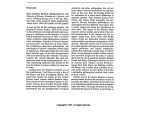Filters: Department: "Philosophy" School Or College: "College of Humanities" Collection: "ir_uspace"
| Creator | Title | Description | Subject | Date | ||
|---|---|---|---|---|---|---|
| 26 |
 |
Nichols, Shaun | Confabulation, confidence, and introspection | Carruthers' arguments depend on a tenuous interpretation of cases from the confabulation literature. Specifically, Carruthers maintains that cases of confabulation are "subjectively indistinguishable" from cases of alleged introspection. However, in typical cases of confabulation, the self-attributi... | Confabulation; Carruthers | 2009-04 |
| 27 |
 |
Landesman, Bruce M. | Confidentiality and the lawyer-client relationship | The Model Rules of Professional Conduct proposed by the American Bar Association differ from the presently enforced Code of Professional Responsibility in a number of ways. This essay focuses on the differences with regard to the scope and limits of confidentiality in the lawyer-client relationship. | Professional Conduct; Confidentiality; Professional Responsibility | 2006-06-16 |
| 28 |
 |
White, Nicholas P. | Conflicting parts of happiness in Aristole's Ethics | Examines the concept of happiness based on Aristotle's view of ethics. Linkage between issues of ethics and altruism; Comparison between Kantian View and Hegelian View about the existence of a genuine dualism; Inclusivism as a common element in Aristotle's ethics; Conflicting parts of happiness. | Criticism; Happiness, moral & ethical aspects | 2001-09-17 |
| 29 |
 |
Battin, Margaret P. | Continuous sedation until death: moral justifications of physicians and nurses─a content analysis of opinion pieces | Continuous Sedation until Death (CSD), the act of reducing or removing the consciousness of an incurably ill patient until death, often provokes medical-ethical discussions in the opinion sections of medical and nursing journals. A content analysis of opinion pieces in medical and nursing literature... | 2012-01-01 | |
| 30 |
 |
Battin, Margaret P. | Contributions of aesthetics | The most tempting answer to the question posed as the topic for these remarks -- "what can aesthetics contribute to a young person's ability to understand and value art?" -- is "nothing", or, at least, "embarrassingly little". Aesthetics, after all, is a field of philosophy, and hence a field dedi... | 1988 | |
| 31 |
 |
Battin, Margaret P. | Coping with methuselah the impact of molecular biology on medicine and society | The prospect of extra-long life spawns a bloom of ethical issues, among them how to achieve intergenerational equity; how to balance health care entitlements with rising costs for the elderly; how to divide years of life between work and retirement; how to assign the responsibilities of young family... | 2004 | |
| 32 |
 |
Francis, Leslie | Creation Ethics and the harms of existence | David DeGrazia's Creation Ethics1 is a fascinating effort to present a consistent account of creation in many contexts-from reproduction, to self-creation through genetic enhancement, to the creation of entire future generations. For reasons of space, this comment addresses the related discussions o... | 2014-01-01 | |
| 33 |
 |
Kukathas, Chandran | Cultural contradictions of socialism | While no one has yet announced the death of capitalism, reports of its imminent demise have been as numerous as they have been exaggerated. Such reports have usually been bolstered by thoughtful analyses of the fundamental contradictions of capitalism, which was expected to come sliding-if not crash... | Economic systems; Social organization | 2002-11-22 |
| 34 |
 |
Battin, Margaret P. | Death ethics: religious and cultural values in prolonging and ending life | In this sequel to his earlier Birth Ethics, Kenneth Vaux again uses what he calls a 'multiphasic ethical scheme," incorporating naturalistic, humanistic, and theistic values to explore the issues of suicide, euthanasia, letting die, genocide, withdrawing life supports, and other end-of-life issues. | 1994 | |
| 35 |
 |
Battin, Margaret P. | Death ethics: religious and cultural values in prolonging and ending life (book review) | A review of the book "Death Ethics: Religious and Cultural Values in Prolonging and Ending Life" by Kenneth L. Vaux. | Books; Life; End of life | 1994-07 |
| 36 |
 |
Landesman, Bruce M. | Decent society (book review) | Review of the book `The Decent Society,' by Avishai Margalit. | Books; Philosophy | 1997-07 |
| 37 |
 |
Chatterjee, Deen | Democracy beyond borders: justice and representation in global institutions | A book review of Andrew Kuper's Democracy Beyond Borders: Justice and Representation in Global Institutions. | Book review; Democracy; Global governance | 2006-04 |
| 38 |
 |
Newman, Lex | Descartes on unknown faculties and our knowledge of the external world | Descartes introduces his skeptical arguments, in the First Meditation, in an order of increasing strength. First, the narrator-meditator notices that judgments concerning the nature of small and distant objects are unreliable; later, that even sensory judgments about large and close objects are in d... | Corporeal existence; Skeptical argument | 1994 |
| 39 |
 |
Newman, Lex | Descartes' epistemology | René Descartes (1596-1650) is widely regarded as the father of modern Philosophy;. His noteworthy contributions extend to mathematics and physics. This entry focuses on his philosophical contributions in the theory of knowledge. Specifically, the focus is on the epistemological project of Descartes... | Descartes; Philosophy;; Epistemology | 2005-04-14 |
| 40 |
 |
Downes, Stephen M. | Disunity of science (book review) | Review of the book `The Disunity of Science: Boundaries, Contexts, and Power,' edited by Peter Galison and David J. Stump | Books; Science; Disunity | 2001-09-24 |
| 41 |
 |
Nichols, Shaun | Do children think of the self as the soul? | Bering's work provides new insight into the child's concept of the self. For his results indicate that children don't regard bodily identity as required for identity of self across time. Bering's methodology for investigating afterlife beliefs might also be exploited to explore the extent to which c... | 2006-10 | |
| 42 |
 |
Millgram, Elijah | Does the categorical imperative give rise to a contradiction in the will? | The Brave New World-style utilitarian dystopia is a familiar feature of the cultural landscape; Kantian dystopias are harder to come by, perhaps because, until Rawls, Kantian morality presented itself as a primarily personal rather than political program. This asymmetry is peculiar for formal reas... | Categorical imperative; Dystopia; Self-refutation | 2003 |
| 43 |
 |
Battin, Margaret P. | Dreariness of aesthetics (continued), with a remedy | In 1951, J. A. Passmore shamelessly titled an essay "The Dreariness of Aesthetics." Drawing on John Wisdom's earlier complaints, he denounced aesthetics' dullness, its pretentiousness, and the fact that it was "peculiarly unilluminating." What Passmore had in mind were the vapid abstractions and m... | Aesthetics; Aestheticians; Art; Beauty | 1986 |
| 44 |
 |
Battin, Margaret P. | Dying in 559 beds: efficiency, "best buys," and the ethics of standardization in national health care | In The Notebooks of Malte Laurids Brigge, the "heavy, difficult book" begun in Rome during the winter of 1903-4 and not finished until 1910 in Paris, Rilke employs a series of rapid, jolting impressions to express his pervasive concern with death and his distress about the institutional character o... | 1992 | |
| 45 |
 |
Hanna, Patricia Lee | Education, society, and human nature: an introduction to the Philosophy; of education (book review) | A review of the book "Education, society, and human nature: an introduction to the Philosophy; of education" by Anthony O'Hear. | Books, reviews; Education, Philosophy | 1982-07 |
| 46 |
 |
Landesman, Bruce M. | Egalitarianism | Despite the popularity of equality as a political value, egalitarianism as a political theory has never, I think, been fully or successfully defended. I aim in this paper to begin the defense of such a view. The egalitarianism I have in mind has as its ideal a condition of equal wellbeing for all p... | Equality; Equal; Theory | 1983 |
| 47 |
 |
Francis, Leslie | Eminent domain compensation in the Western states: a critique of the fair market value model | Both the United States Constitution and the constitutions of the states of the intermountain west and the Pacific Coast prohibit the state from taking property without paying just compensation. Thus, there are two basic issues in any eminent domain case. First, has governmental interference with pro... | Eminent domain; Compensation; Governmental interference; Fair Market Value | 2006-06-16 |
| 48 |
 |
Francis, Leslie | Employment and intellectual disability | Under recent decisions of the United States Supreme Court, people with disabilities alleging employment discrimination under the Americans with Disabilities Act (ADA) are caught in a vicious triangle. One vertex of the triangle is self-accommodation. Correcting for their impairments through effort,... | Americans with Disabilities Act; ADA; Intellectual disability | 2004 |
| 49 |
 |
Francis, Leslie | End of life decision-making for patients with dementia | In decision-making for patients with dementia, law and bioethics recognize two central goals: protecting the patient's autonomy and protecting the patient's best interests. These two objectives are not always consistent, however, nor easily applied over the long, downhill course experienced by mos... | 2001 | |
| 50 |
 |
Francis, Leslie | Ensuring the privacy and confidentiality of electronic health records | In 2004, President Bush announced his plan to ensure that most Americans would have electronic health records within ten years. Although substantial progress has been made toward achieving that goal, this progress has primarily reflected institutional interests and priorities by focusing on system ... | 2007 |
